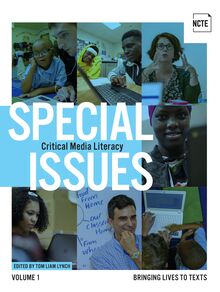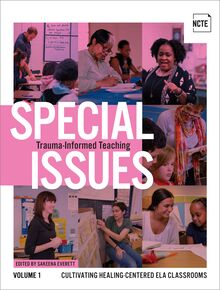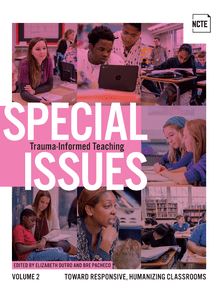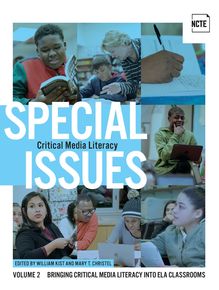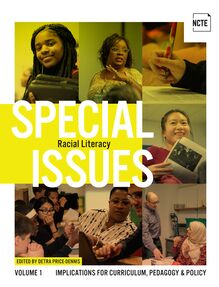-
 Univers
Univers
-
 Ebooks
Ebooks
-
 Livres audio
Livres audio
-
 Presse
Presse
-
 Podcasts
Podcasts
-
 BD
BD
-
 Documents
Documents
-
- Cours
- Révisions
- Ressources pédagogiques
- Sciences de l’éducation
- Manuels scolaires
- Langues
- Travaux de classe
- Annales de BEP
- Etudes supérieures
- Maternelle et primaire
- Fiches de lecture
- Orientation scolaire
- Méthodologie
- Corrigés de devoir
- Annales d’examens et concours
- Annales du bac
- Annales du brevet
- Rapports de stage
La lecture à portée de main
Vous pourrez modifier la taille du texte de cet ouvrage
Découvre YouScribe en t'inscrivant gratuitement
Je m'inscrisSpecial Issues, Volume 1: Racial Literacy , livre ebook
Découvre YouScribe en t'inscrivant gratuitement
Je m'inscrisEn savoir plus
Vous pourrez modifier la taille du texte de cet ouvrage
En savoir plus

Description
Edited by Detra Price-Dennis, this first volume of Special Issues: Racial Literacy gathers some of the most compelling and practical recent articles across NCTE journals, addressing the importance of racial literacy and its implications for curriculum, pedagogy, and policy.
There’s a great deal of uncertainty, discord, and increased volatility across a number of critical institutions in our society. Each day on social media and TV news outlets we read, listen to, and/or watch events unfold that are linked to political, economic, health, legal, and educational inequities that can be traced to racist ideologies and practices. Public schools across the country are being subjected to pending state legislation and new laws that seek to limit how race—among other markers of identity—can be taught in K–12 classrooms.
Editor Detra Price-Dennis has curated this collection to show how teaching from a racial literacy perspective is in conversation with antiracist, culturally responsive, equity-oriented frameworks that uplift curriculum design and instructional strategies. These articles can help educators (re)imagine the classroom as a space that supports the development of racial literacy skills and practices with their students.
About the Special Issue series:
Most teachers and students across the country are grappling with several important issues. We hear from many educators who are looking for compelling and engaging approaches racial literacy, critical media literacy, and trauma-informed teaching.
NCTE is responding to these needs with Special Issues, a series of books designed to directly address these pressing topics in K-12 and college classrooms today. The first volumes collect content on these topics from across all of NCTE’s journals in one place, to make the most relevant material accessible and practical.
Edited by expert practitioners in the field, each volume contains teaching tips to help implement these approaches in classrooms.
Sujets
Informations
| Publié par | National Council of Teachers of English (NCTE) |
| Date de parution | 10 décembre 2021 |
| Nombre de lectures | 0 |
| EAN13 | 9780814100110 |
| Langue | English |
| Poids de l'ouvrage | 1 Mo |
Informations légales : prix de location à la page 0,1250€. Cette information est donnée uniquement à titre indicatif conformément à la législation en vigueur.
Extrait
TITLES IN THE SERIES
RACIAL LITERACY
Vol. 1: Implications for Curriculum, Pedagogy, and Policy
CRITICAL MEDIA LITERACY
Vol. 1: Bringing Lives to Texts
TRAUMA-INFORMED TEACHING
Vol. 1: Cultivating Healing-Centered ELA Classrooms
Editor: Detra Price-Dennis
Series editor: James Sitar
Cover and interior design: Ash Goodwin
Cover images: Marvin Young
Typesetter: Jim Gallagher
ISBN: 978-0-8141-4492-3 elSBN: 978-0-8141-4493-0
© 2021 by the National Council of Teachers of English.
All rights reserved. No part of this publication may be reproduced or transmitted in any form or by any means, electronic or mechanical, including photocopy, or any information storage and retrieval system, without permission from the copyright holder. Printed in the United States of America.
It is the policy of NCTE in its journals and other publications to provide a forum for the open discussion of ideas concerning the content and the teaching of English and the language arts. Publicity accorded to any particular point of view does not imply endorsement by the Executive Committee, the Board of Directors, or the membership at large, except in announcements of policy where such endorsement is clearly specified.
NCTE provides equal employment opportunity to all staff members and applicants for employment without regard to race, color, religion, sex, national origin, age, physical, mental or perceived handicap/disability, sexual orientation including gender identity or expression, ancestry, genetic information, marital status, military status, unfavorable discharge from military service, pregnancy, citizenship status, personal appearance, matriculation or political affiliation, or any other protected status under applicable federal, state, and local laws.
Every effort has been made to provide current URLs and email addresses, but, because of the rapidly changing nature of the web, some sites and addresses may no longer be accessible.
Library of Congress Cataloging-in-Publication Data applied for.
NCTE
340 N. Neil Street, Suite 104 | Champaign, IL 61820
www.ncte.org
IMPLICATIONS FOR CURRICULUM, PEDAGOGY, AND POLICY
07 Editor's Introduction
DETRA PRICE-DENNIS
11 Policy Statement on Racial Literacy
YOLANDA SEALEY-RUIZ
16 Where Do We Go from Here?: Toward a Critical Race English Education
LAMAR L. JOHNSON
31 To Dismantle Racism, We Must Discuss It
LORENA GERMÁN
33 Everyday Colorism: Reading in the Language Arts Classroom
SARAH L. WEBB
40 Centering #BlackLivesMatter to Confront Injustice, Inspire Advocacy, and Develop Literacies
JODY POLLECK & TASHEMA SPENCE-DAVIS
47 Reopening Racial Wounds: Whiteness, Melancholia, and Affect in the English Classroom
JUSTIN GRINAGE
61 Creating Space for Middle School Students to Discuss Race
BETH BESCHORNER, ROBBIE BURNETT & KATHLEEN FERRERO
65 Tough Talking: Teaching White Students about Race and Responsibility
CAROL KELLY
69 Antiracist Language Arts Pedagogy Is Incomplete without Black Joy
DAMARIS DUNN & BETTINA L. LOVE
71 Revealing the Human and the Writer: The Promise of a Humanizing Writing Pedagogy for Black Students
LATRISE P. JOHNSON & HANNAH SULLIVAN
85 Reading Representations of Race: Critical Literacy and Ferguson
SUMMER MELODY PENNELL
92 “The creative aspect woke me up”: Awakening to Multimodal Essay Composition as a Fugitive Literacy Practice
ESTHER O. OHITO & THE FUGITIVE LITERACIES COLLECTIVE
107 (W)rites of Passage: Black Girls’ Journaling and Podcast Script Writing as Counternarratives
DELICIA TIERA GREENE
112 Brown Girls Dreaming: Adolescent Black Girls’ Futuremaking through Multimodal Representations of Race, Gender, and Career Aspirations
JENNIFER D. TURNER & AUTUMN A. GRIFFIN
128 “My Color of My Name”: Composing Critical Self-Celebration with Girls of Color through a Feminist of Color Writing Pedagogy
GRACE D. PLAYER
144 Disrupting Race-Evasive Practices in Literacy Teacher Education: Reflections on Research and Implications for Policy
MELISSA MOSLEY WETZEL
154 “I know you don't live in Detroit, right?” An Attempt at Racial Literacy in English Education
MARY L. NEVILLE
161 In Dialogue: Solidarity
DANNY C. MARTINEZ, APRIL BAKER-BELL, ALAYNA EAGLE SHIELD & CLIFFORD H. LEE
170 Call for Manuscripts: Volume 2
EDITOR'S INTRODUCTION
DETRA PRICE-DENNIS
My Racial Literacy Journey
As a young Black girl growing up in West Virginia, I remember spending a lot of time thinking about race. My earliest memory involves showing off my knowledge of the color wheel to my family, as we gathered in the living room after dinner. I handed my father a brown piece of construction paper, my mother a yellow piece of construction paper, my grandmother a black piece of construction paper, and my grandfather a white piece of construction paper. In my mind, the colored papers represented how I saw their racialized identity. While I don't remember what anyone said, I recall many stories I have been told about this moment and how their smiles, silence, and looks to each other spoke volumes.
Prior to this moment, I was intrigued by the varying skin tones in my family and spent a lot of time trying to make sense of those variations. Though I do not remember using the word race, it was something that I was not afraid to question, discuss with others, and draw attention to in my community. I noticed all of the spaces and places where I was the only Black child—and where my family were the only Black people—as well as the spaces and places where everyone was Black. My observations did not make me feel sad, angry, or afraid, and they never got in my way of making friends and having enjoyable experiences. However, I do remember wondering why people were grouped together in those ways. My observations and questions evolved as I got older, and I would ask my dad excessively why we never saw Black people on hikes, at the beach, or at this magical toy store that was nestled on top of a mountain. I also wondered why there were no white people at our church, whether you had to be white to work at the bank or jewelry store, and why white people did not live in my grandparents’ neighborhood. Out of all of those questions, I remember one response: my father told me that when he was little, the city opened up a tract of land for Black people to purchase and build homes. Before this time, Black families could not own property. I also learned that the Black families who lived on his parents’ street were business owners, coaches, teachers, and nurses: they were the first Black people to live in a planned community within the city. The original families stayed in the neighborhood in the homes they built, which is why my grandparents did not have white neighbors. Although I do not recall how I reacted to this information, I do remember thinking that race and power were connected.
As I reflect on those memories now, I recognize the tentative—and then more confident—steps I was taking on my path to racial literacy development. My early experiences talking about race opened up conversations with my family about historical literacies, power, financial disparities, labor, colorism, diversity stereotypes, racism, and social class, to name a few topics. During this formative time, no one told me to avoid these discussions because I was too young or that talking about race made people uncomfortable. Consequently, these conversations informed the narrative I was developing about living in a racialized society and what that meant for me and my family. The preceding vignette illustrates my personal history related to activating my racial consciousness. According to Sealey-Ruiz, this is a first and necessary step in the archaeology-of-self process that educators committed to racial equity move through to better understand how our racial literacy pedagogy is connected to our life experiences (Price-Dennis & Sealey-Ruiz, 2021; Sealey-Ruiz, 2020).
What Is Racial Literacy?
Racial literacy is a construct that foregrounds the relationship between race and power. Price-Dennis and Sealey-Ruiz define racial literacy as “a skill practiced when individuals are able to probe the existence of racism and examine the effects of race as it intersects with institutionalized systems” (2021, p. 14). Racial literacy can be used to analyze how being raced (e.g., through racial profiling, discrimination, or violence) in our society has material consequences for people of color that impact employment, housing, health care, finances, and education. The origin of the concept of racial literacy can be traced back to the work of sociologist France Winddance Twine (2004; 2010) and her research on racial socialization. Scholars in the field of literacy education have drawn on racial literacy to better understand the ways educators and students navigate and make sense of race and racism and the ways they affect student participation, pedagogical choices, curriculum development, policies, and experiences that shape identity construction.
Sealey-Ruiz (2020) and Guinier (2004) engage racial literacy as a heuristic that exposes structural racism to better understand how racial identity shapes experiences in our society, specifically in schools. Accordingly, Sealey-Ruiz & Greene argue that racial literacy is a “skill and practice in which individuals are able to discuss the social construction of race, probe the existence of racism and examine the harmful effects of racial stereotypes” (2015, p. 60). K-12 literacy educators have been effective advocates for curriculum, school policy, and pedagogy that support this approach to racial literacy in their classrooms. This collection shows how teaching from a racial literacy perspective is in conversation with antiracist, culturally responsive, equity-oriented frameworks that uplift curriculum design and instructional strategies to help educators (re)imagine the classroom as a space that supports the development of racial literacy skills and practices wi
-
 Univers
Univers
-
 Ebooks
Ebooks
-
 Livres audio
Livres audio
-
 Presse
Presse
-
 Podcasts
Podcasts
-
 BD
BD
-
 Documents
Documents
-
Jeunesse
-
Littérature
-
Ressources professionnelles
-
Santé et bien-être
-
Savoirs
-
Education
-
Loisirs et hobbies
-
Art, musique et cinéma
-
Actualité et débat de société
-
Jeunesse
-
Littérature
-
Ressources professionnelles
-
Santé et bien-être
-
Savoirs
-
Education
-
Loisirs et hobbies
-
Art, musique et cinéma
-
Actualité et débat de société
-
Actualités
-
Lifestyle
-
Presse jeunesse
-
Presse professionnelle
-
Pratique
-
Presse sportive
-
Presse internationale
-
Culture & Médias
-
Action et Aventures
-
Science-fiction et Fantasy
-
Société
-
Jeunesse
-
Littérature
-
Ressources professionnelles
-
Santé et bien-être
-
Savoirs
-
Education
-
Loisirs et hobbies
-
Art, musique et cinéma
-
Actualité et débat de société
- Cours
- Révisions
- Ressources pédagogiques
- Sciences de l’éducation
- Manuels scolaires
- Langues
- Travaux de classe
- Annales de BEP
- Etudes supérieures
- Maternelle et primaire
- Fiches de lecture
- Orientation scolaire
- Méthodologie
- Corrigés de devoir
- Annales d’examens et concours
- Annales du bac
- Annales du brevet
- Rapports de stage
